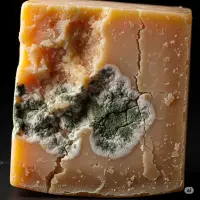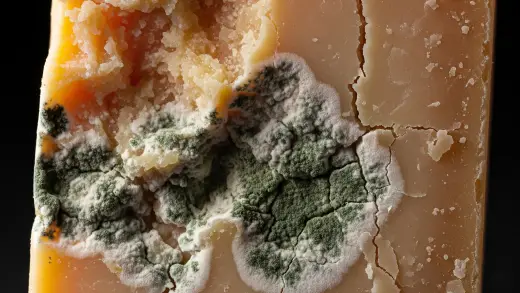So, can you be allergic to blue cheese? Yes, an allergic reaction to blue cheese is possible, though not as common as some other food allergies. If you experience symptoms, two main components of blue cheese could be responsible.
Since blue cheese is a dairy product, if you have an underlying milk allergy, you might experience a reaction. The proteins in milk are a common trigger for allergies, so this could be why you react.
Alternatively, the distinctive molds that create the characteristic blue or green veins in blue cheese could also be an issue for you. If you have a general mold allergy, you might find that these specific molds trigger your symptoms.
However, your reactions can vary significantly, from milder issues like a skin rash to severe, life-threatening anaphylaxis. It’s a reminder that various foods, not just the most common allergens, can potentially cause you to have an allergic response.

Read more on Can Too Much Cheese Cause Diarrhea and Are enzymes in cheese bad for you.
What Causes Blue Cheese Allergies?
So, what’s behind a blue cheese allergy? It usually boils down to a couple of things. First, let’s talk about milk. Blue cheese, like many other delicious cheeses, is a dairy product. That means it’s made from milk.
Lots of people, especially kids, have milk allergies. When someone’s allergic to milk, their body mistakenly sees the proteins in milk as harmful invaders. This triggers a reaction, which can show up as itchy skin, tummy troubles, or even breathing problems.
If you’re allergic to milk, blue cheese is definitely off the menu.
Milk Allergy Symptoms
Think hives, rashes, stomach cramps, nausea, vomiting, diarrhea, and sometimes even trouble breathing.
But there’s another potential problem: mold! Those characteristic blue or green veins running through blue cheese are actually special kinds of mold. These molds are what give blue cheese its unique flavor.
However, some people are allergic to molds. Just like with milk, their bodies overreact to the mold in blue cheese. This can also lead to allergy symptoms.
Mold Allergy Symptoms
These can include sneezing, a runny or stuffy nose, itchy eyes, coughing, and sometimes even asthma symptoms.
So, if you’re allergic to mold, blue cheese might cause a reaction. It’s like a double whammy – you could be reacting to the milk, the mold, or even both!
Other Potential Allergens
Beyond milk and mold, are there other things in blue cheese that could trigger allergies? While less common, it’s possible.
Sometimes, cheesemakers use specific enzymes during the cheese-making process. These enzymes help give the cheese its texture and flavor. Although rare, some people might be allergic to these enzymes.
Also, while blue cheese itself doesn’t typically have a lot of added ingredients, it’s always possible that trace amounts of other substances could be present, depending on how and where the cheese was made.

What are the Symptoms of a Blue Cheese Allergy?
So, you think you might be allergic to blue cheese? It’s important to know what the symptoms of a blue cheese allergy can look like. Allergic reactions can range from mild annoyances to serious, life-threatening situations. Let’s break down the common signs:
· Skin Reactions
These are some of the most common allergy symptoms. Think itchy skin, rashes, hives (raised, red bumps that look like welts), or eczema flare-ups.
· Stomach Troubles
Blue cheese can also upset your digestive system. You might experience nausea, vomiting, diarrhea, or stomach cramps.
· Respiratory Problems
Allergies can affect your breathing too. You might have a runny or stuffy nose, sneezing, coughing, wheezing, or even difficulty breathing.
These are some of the more common symptoms, and they can vary in severity. A mild reaction might just involve a little itching or a few hives. But a more serious reaction can cause more intense symptoms, like widespread rashes, severe vomiting, or significant breathing difficulties.
Now, let’s talk about something really important: anaphylaxis. This is a severe, potentially life-threatening allergic reaction. Anaphylaxis can happen very quickly and can affect multiple parts of the body at once.
· Anaphylaxis Symptoms
These can include trouble breathing, swelling of the tongue or throat, a rapid heartbeat, dizziness, fainting, and a sudden drop in blood pressure.
If you or someone you’re with experiences any of these symptoms after eating blue cheese, it’s crucial to get medical help immediately.

How Are Blue Cheese Allergies Diagnosed and Treated?
If you suspect you have an allergy to blue cheese, it’s important to get a proper diagnosis from a healthcare professional, typically an allergist. They will likely use a combination of methods to determine if an allergy exists and to identify the specific trigger, which could be milk proteins or the molds present in blue cheese.
Finding the Culprit: Allergy Testing
Just like a detective uses clues, allergists use tests to pinpoint what’s triggering your allergies. Two common methods are skin prick tests and blood tests.
- Skin Prick Test: Imagine a tiny drop of blue cheese extract (or other potential allergens) placed on your skin. Then, a little prick is made, just enough to let the substance in. If you’re allergic, a small, itchy bump will usually pop up within minutes, kind of like a mosquito bite.
- Blood Test: This test involves a simple blood draw. The blood is then checked in a lab for specific antibodies, which are like your body’s “defense squad” that react to allergens. High levels of these antibodies for blue cheese suggest an allergy.
The Expert’s Eye: Seeing an Allergist
While these tests are helpful, it’s super important to see an allergist. They’re like the expert detectives of the allergy world. They can interpret the test results, consider your medical history, and give you a clear diagnosis. Don’t try to diagnose yourself! It’s best to leave it to the pros.
Fighting Back: Treatment Options
Okay, so you’ve been diagnosed with a blue cheese allergy. Now what? Luckily, there are ways to manage it:
- Antihistamines: These are your go-to for milder symptoms like itching, sneezing, or a runny nose. They work by blocking histamine, a chemical your body releases during an allergic reaction. Think of them as the “chill pills” for your immune system.
- Epinephrine Auto-injectors (EpiPens): For serious reactions, like trouble breathing or swelling, an EpiPen is a must-have. It delivers a dose of epinephrine, a medication that can quickly reverse these dangerous symptoms. It’s like a superhero’s emergency kit!

The Golden Rule: Avoidance
The most important part of managing a blue cheese allergy? Avoiding blue cheese! This might seem obvious, but it can be trickier than you think. Always read food labels carefully, and when you’re eating out, be sure to let your server know about your allergy.
It’s better to be safe than sorry! Think of it this way: you’re protecting your health by being a super-sleuth about what you eat.
Tips for Managing a Blue Cheese Allergy
So, you’ve got a blue cheese allergy? Don’t worry, you can still enjoy plenty of delicious foods! It just means being a little extra careful and becoming a super sleuth when it comes to what you eat. Here are some helpful tips to keep in mind:
Become a Food Label Detective
Reading food labels is essential. Think of it as your secret weapon against accidental blue cheese encounters. Blue cheese can sometimes hide in surprising places. For example:
- Salad Dressings: Creamy dressings, especially those with “gourmet” or “specialty” labels, might contain blue cheese for added flavor.
- Dips and Sauces: Blue cheese is a common ingredient in dips for veggies or chips, and creamy sauces for pasta or chicken.
- Prepared Meals: Frozen meals, pre-made pizzas, or even some deli salads might contain blue cheese.
Spread the Word
Letting people know about your allergy is a big part of staying safe. Don’t be shy about it!
- Restaurants: When you eat out, always tell your server about your blue cheese allergy. Ask them to double-check with the kitchen to make sure your food is blue cheese-free.
- Friends and Family: Let your friends and family know about your allergy, especially if they’re cooking for you. This way, they can help you avoid any accidental exposures.
Be Prepared
Being prepared is like having a superhero’s toolkit for allergies.
- Allergy Card or Medical Alert Bracelet: Consider carrying an allergy card that lists your allergy and any important medical information. A medical alert bracelet can also be helpful in case of an emergency.
- Medication: Always carry your prescribed allergy medication with you, especially if you have a history of severe reactions.
This might include antihistamines for milder symptoms or an epinephrine auto-injector (like an EpiPen) for more serious reactions. Knowing where your medication is and how to use it is super important.
FAQs
Can I have blue cheese if I’m allergic to penicillin?
Yes, you generally can. According to the American Academy of Allergy, Asthma, and Immunology, the Penicillium cultures that create blue cheese do not produce penicillin.
Therefore, it is generally safe for people with penicillin allergies to eat blue cheese, as long as the cheese has not spoiled. Always consult your doctor for personal advice.
Can you eat blue cheese with a dairy allergy?
No, if you have a dairy allergy, you should not eat blue cheese. A dairy allergy is a reaction to milk proteins, and blue cheese is a dairy product made from milk. While blue cheese has a low lactose content (0-2.5%), making it “great for people with lactose intolerance,” this is different from a dairy allergy.
What are the side effects of blue cheese?
Aged cheeses like blue cheese contain tyramine, which can trigger migraines in susceptible individuals. Other potential side effects include issues related to its high fat and sodium content.
In some cases, soft cheeses carry a risk of listeria contamination, and spoiled blue cheese can cause food poisoning due to mycotoxins.
What is the easiest cheese to digest?
If you’re looking for an easy-to-digest cheese, you might find goat cheese a good option. It’s often easier for your system to handle than cow’s milk cheese because its different proteins (primarily A2 casein) may not irritate your digestive system.
You’ll also find it has more medium-chain fatty acids, which your body can absorb quickly.
Why do I feel sick after eating blue cheese?
You might feel sick after eating blue cheese due to a few reasons. You could have a milk or mold allergy, or even a histamine intolerance. Less commonly, it could be due to food poisoning if the cheese wasn’t stored properly. If symptoms persist, consult a doctor.
Conclusion
So, there you have it. While it’s not the most common food allergy, a blue cheese allergy is definitely possible. The culprits are usually the milk it’s made from or the mold that gives it its distinctive flavor.
If you’re experiencing any unusual symptoms after eating blue cheese, or if you suspect you might have an allergy, don’t hesitate to talk to an allergist. They can help you figure out what’s going on and how to stay safe.














